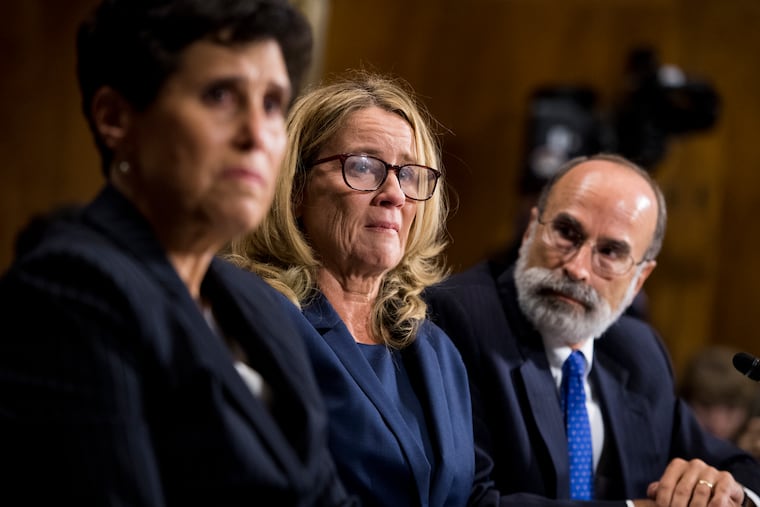As Kavanaugh hearings stir sexual trauma survivors’ memories, crisis centers are ready
As Christine Blasey Ford testifies about sexual assault allegations against Brett Kavanaugh Thursday, rape crisis centers around the region are seeing an increase in calls from sexual assault survivors — some saying the hearing is reviving old trauma and others finding it empowering.

As Christine Blasey Ford testified about sexual assault allegations against Supreme Court nominee Brett Kavanaugh on Thursday, crisis centers around the Philadelphia region said they had seen an increase in calls from sexual assault survivors, in equal part traumatized by the details they heard, and empowered by seeing a woman tell her story so publicly.
"For some people it's throwing them into action," said Karen Baker, chief executive officer of the Pennsylvania Coalition Against Rape, which represents 48 crisis centers across the state. "They'll say, 'I hadn't been vocal about this before, but I'm going to be now.' But other people are driven more into silence."
The National Sexual Assault Hotline estimated its call volume increased 147 percent above normal on Thursday, according to a spokesperson for the Rape, Abuse & Incest National Network, which runs the hotline. Most local rape crisis centers don't fully analyze their call data until the end of a month, but they say they have been noticing a marked increase in callers in recent weeks as allegations against Kavanaugh have been in the news.
Ford has accused Kavanaugh of holding her down and drunkenly groping her at a high school party. Deborah Ramirez, a classmate of Kavanaugh's at Yale University, said he exposed himself to her in college. A third woman, Julie Swetnick, came forward Wednesday, claiming Kavanaugh spiked drinks at a high school party where she was gang-raped, though she did not say he participated in the attack. Kavanaugh has denied all allegations.
As Ford's testimony was underway Thursday, C-SPAN, which was broadcasting the hearing along with most major networks, reported people were calling in with their own stories of sexual violence.
Democratic Sen. Chris Coons of Delaware said three women reached out to him within the span of an hour, saying they are victims of sexual assault, too. "It is striking how many survivors of sexual assault are watching and choosing this moment to come forward with their accounts," he said.
Many callers are recognizing certain childhood experiences as sexual assault for the first time, said Erin Slight, supervisor of direct services at the Victim Services Center of Montgomery County. "That kind of behavior might have been normalized in the past," Slight said. "But now people are being given words to name it. They realize what happened, and they can call. That is powerful."
While she did not have data for this month, Slight said, during past events that brought sexual violence to the national spotlight — like Bill Cosby's trial and sentencing, and the Jerry Sandusky scandal at Pennsylvania State University — call volume increased about 25 percent. She expects the numbers will be similar in response to the Kavanaugh hearings.
But not all the calls reflect empowerment. For some survivors, watching Ford's testimony is having a darker effect. Hearing skeptical senators can bring back memories of being shamed and doubted. That can lead to low self-esteem and isolation, Slight said. It might dissuade some from calling or seeking services at all.
Many are recognizing the toll sexual trauma has taken on their lives for years, Baker said. Seeing Ford testify about her post-traumatic stress disorder, claustrophobia, and fear of flying may help others realize that their insomnia or panic attacks may be connected to their own history of trauma.
It can lead to a lot of conflicting feelings, Baker said. Most survivors want to stand in solidarity with Ford — some have even contacted the coalition to organize demonstrations — but many also fear facing the same backlash as Ford, who has received death threats.
Survivors need to handle their feelings whatever way is best for them, Baker said. If they're feeling overwhelmed, they should consider turning off the TV, putting down the cell phone, and taking a walk instead. Going for a run, interacting with pets, or taking a drive can all help.
She also recommended reaching out to a friend, family member, or local crisis center. Many have 24/7 hotlines and online chat rooms that can provide support.
"Sometimes it's 2 a.m. and people can't go to sleep because that's all they can think about," said Gina Ridge, who helps coordinate victim services at the Center for Family Services in Camden. "We're there for them to talk and help them work through it."
The center has seen demand for its online chat room double in recent weeks. Ridge said the center has helped people access counseling services or begin the process of pressing charges. (There is no statute of limitations on sexual assault charges in New Jersey.)
"People are wanting to speak up because they feel like other people have, and they might be believed at this point in their life," Ridge said.
If you need help, call the National Sexual Assault Hotline at 1-800-656-4673. You can find your local rape crisis center by searching a national database, centers.rainn.org. For services in Pennsylvania, visit www.pcar.org, and for Southern New Jersey, visit www.centerffs.org/serv.